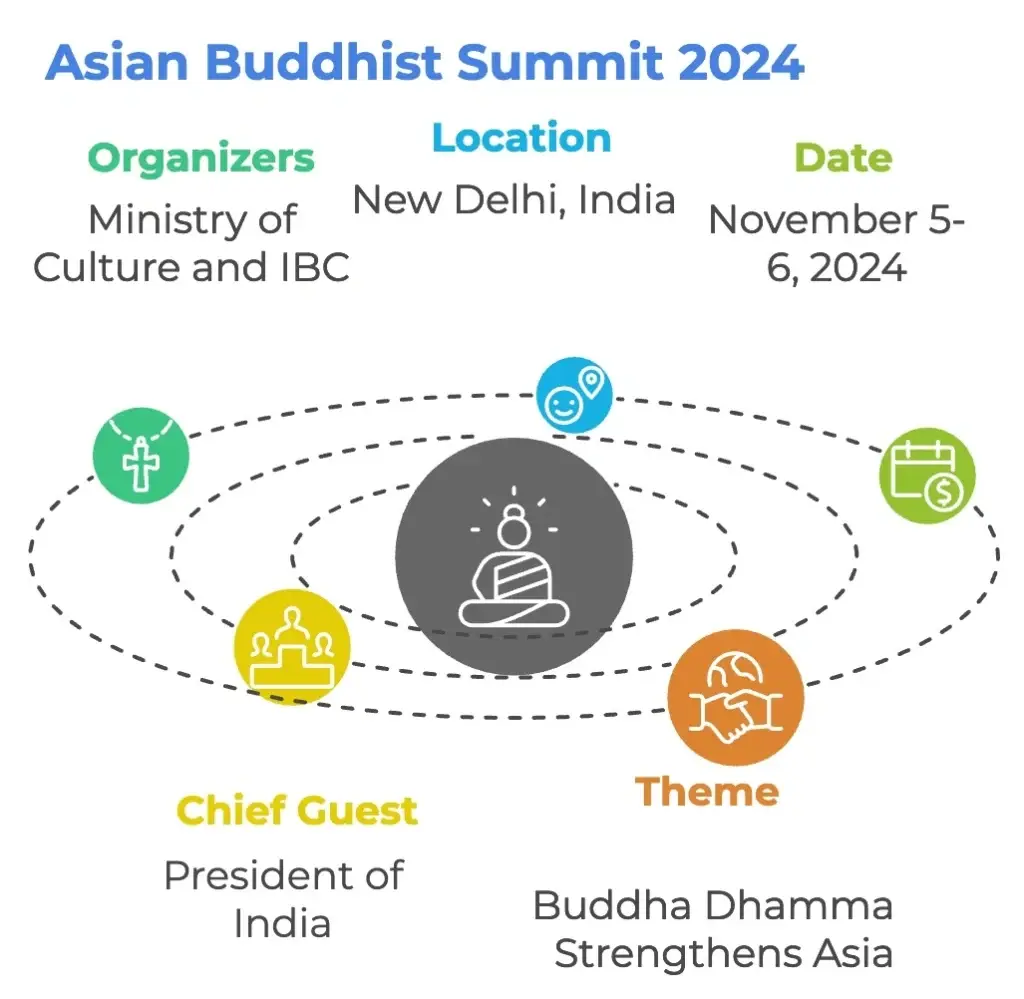The United Nations
- The United Nations (UN) was created after the League of Nations failed to maintain world peace.
- The League of Nations was established in 1919 after World War I under the Treaty of Versailles “to promote international cooperation and to achieve peace and security”.
Creation of the United Nations
Reason of failure
- The League of Nations did not have the support of important countries such as the United States and the Soviet Union. This made the League weak and ineffective.
- The League was closely linked to the Treaty of Versailles, which ended World War I. Many countries, especially Germany, saw this treaty as unfair.
- The League was controlled by the victorious powers of World War I France and Britain. This created a sense of unfairness in the League.
- Countries like Germany were forced to pay heavy war reparations which affected their economic situation.
Table of contents
- Representatives from 50 countries met in San Francisco, California after World War II from April 25 to June 26, 1945.
- They gathered for the United Nations Conference on International Organization.
- Their task was to create a new organization that would prevent future wars, which would be called the United Nations (UN).
- UN Charter was drafted during the conference. This Charter set out the goals and principles of the United Nations.
- The Charter was signed on June 26, 1945, and officially came into force on October 24, 1945.
- UN Charter was officially ratified after the San Francisco Conference.
- The United Nations began its work on October 24, 1945, when the Charter was signed by a majority of the countries.
- 24 October is celebrated as United Nations Day every year.
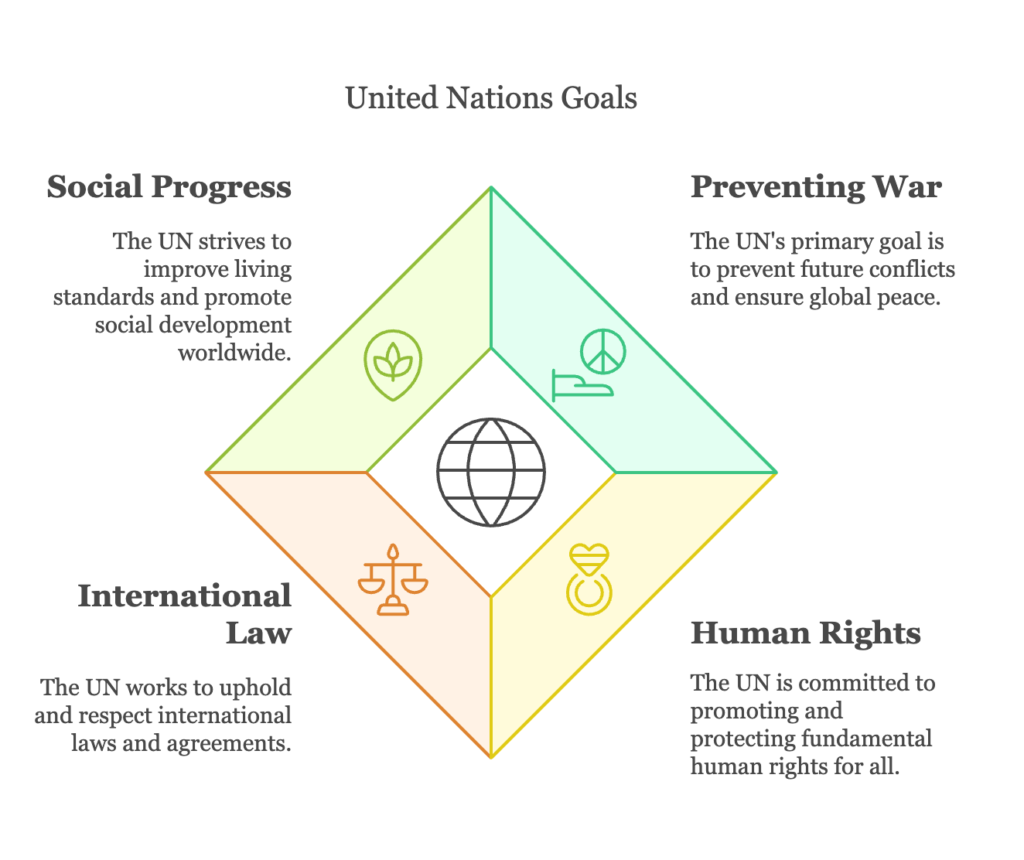
Four Pillars of the United Nations (UN)
The United Nations (UN) is built on four main goals, also known as its pillars. These pillars guide the work of the UN in its efforts to create a more peaceful and just world.
- Save Succeeding Generations from War: The primary purpose of the UN, as mentioned in the Preamble of the UN Charter is to prevent future wars.
- Reaffirm Faith in Human Rights: The UN is dedicated to promoting and protecting the fundamental human rights of all individuals.
- Uphold Respect for International Law: The UN aims to establish conditions that respect international law.
- Promote Social Progress and Better Standards of Life: The UN works to improve the quality of life for people around the world.
Principal organs of the United Nations
- The six principal organs of the United Nations are the General Assembly, Security Council, Economic and Social Council (ECOSOC), Trusteeship Council, International Court of Justice (ICJ), and the UN Secretariat, all established under the UN Charter in 1945.
- These organs work together to promote international peace, security, human rights, and social progress, with each organ playing a specific role in carrying out the UN’s objectives
Trusteeship Council
- The Trusteeship Council was created in 1945 by the United Nations Charter. It aimed to help territories under UN trusteeship achieve self-government and independence.
- The Council supported these territories in political, economic, and social development for autonomy.
- All Trust Territories gained independence or self-government by 1994. This ended the Trusteeship Council’s control over these territories.
- The Trusteeship Council suspended operations on November 1, 1994. The last Trust Territory, Palau, gained independence that same year.
- Trusteeship Council made an important change to its rules in May 1994. It agreed to stop meeting annually.
- It would meet only when required. It may be decided upon by the Council or its President, or it may be requested by a majority of its members.
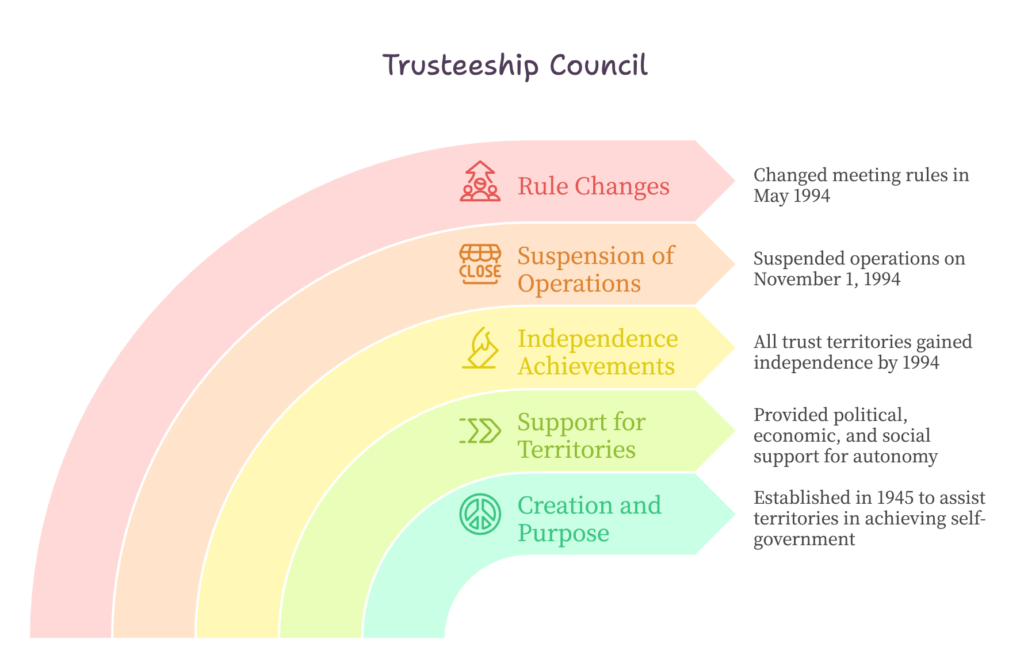
United Nations General Assembly(UNGA)
- The General Assembly serves as the primary deliberative, policymaking, and legislative organ of the United Nations and It represents all 193 Member States.
- UN membership gathers in the General Assembly Hall in New York for the annual session each year in September.
- A President is elected annually by the Member States to serve a one-year term and oversee the work of the Assembly.
Role and Powers:
- The General Assembly provides a platform for multilateral discussions on various international issues under the UN Charter.
- Each of the 193 Member States has one equal vote,
- The General Assembly has important functions such as:
- Appointing the Secretary-General on the recommendation of the Security Council.
- Electing non-permanent members to the Security Council.
- Approving the UN budget.
- It acts as the legislative body of the UN.
- It provides a forum for debate and discussion among Member States.
Sessions and Resolutions:
- Regular sessions occur from September to December and can continue as required.
- Specific issues are addressed through dedicated agenda items or sub-items which leads to the adoption of resolutions.
Decision-Making Process:
- Decisions on major issues, such as international peace and security, admission of new members, and budgetary matters, require a two-thirds majority.
- Decisions on less critical matters are made by a simple majority vote.
United Nations Security Council (UNSC)
- The United Nations Security Council (UNSC) serves as the executive body of the United Nations and holds the primary responsibility for maintaining international peace and security.
Functions:
- The UNSC determines the existence of any threat to peace or act of aggression.
- It recommends appropriate measures to address these threats, including diplomatic or economic actions.
- The Council can call upon member states to apply economic sanctions and other measures not involving the use of force to prevent or stop aggression.
- In cases where non-military measures are inadequate, the UNSC can authorize the use of force to maintain or restore international peace and security.
- The Council recommends the admission of new member states to the General Assembly.
Membership:
The Security Council has 15 members:
Permanent Members:
- The Council has five permanent members known as the “P5” and possesses veto power over substantive decisions: China, France, Russia,the United Kingdom and the United States.
- The UN Charter of 1945 granted them permanent seats on the Security Council.
- The veto power allows any of the five permanent members to cast a negative vote against any substantive resolution in the Security Council.
- If a permanent member votes against a resolution, it will not be approved.
Non-Permanent Members:
- Ten non-permanent members are elected by the General Assembly for two-year terms, with seats allocated to ensure equitable regional representation:
- Africa: 3 seats
- Asia-Pacific: 2 seats
- Latin America and the Caribbean: 2 seats
- Western Europe and Others: 2 seats
- Eastern Europe: 1 seat
- The non-permanent members are elected for two-year terms by the United Nations General Assembly (UNĠA) by the majority of ⅔.
- Five non-permanent members of the UNSC are replaced every year.
- Non-permanent members are not immediately re-eligible after serving a term.
| UNSC voting procedures Decisions in the UNSC are classified as either procedural or substantive. Procedural matters: Decisions on procedural matters are made by an affirmative vote of at least nine of the 15 members. A negative vote from a permanent member does not invalidate a decision. Substantive matters: Decisions on substantive issues require at least nine affirmative votes which must include the concurrence of all five permanent members. Veto Power: This requirement grants each permanent member the ability to veto substantive decisions by casting a negative vote. Double Veto: The term “double veto” is a situation where a permanent member exercises its veto power twice: first, to determine whether an issue is procedural or substantive, and second, to veto the substantive decision itself. This mechanism allows permanent members to influence both the classification and outcome of decisions within the Council. |
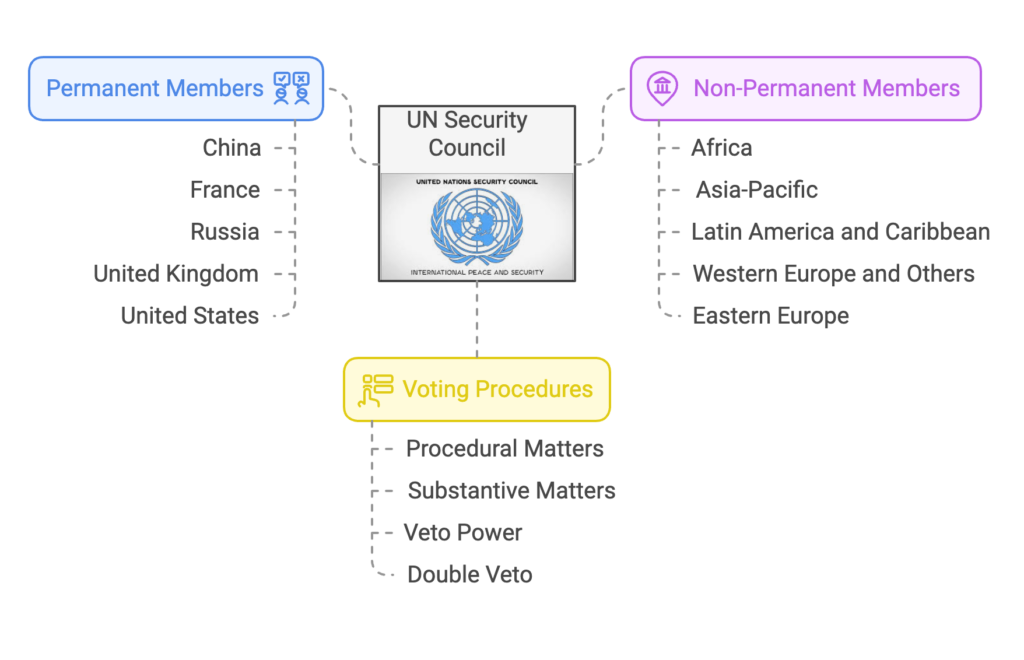
UNSC reforms
- The United Nations Security Council (UNSC) originally had 11 members, with 5 permanent members and 6 non-permanent members with the strength of 51 members overall in UNGA.
- It is not democratic particularly due to the use, or threat of the use, of the veto power by one or more of the privileged.
- The General Assembly recommended an amendment to the UN Charter to increase the number of members to 15 in 1963. The amendment entered into force in 1965.
- It was expanded only once in 1963 to add 4 non-permanent members.
- The overall membership of the UN has increased from 113 to 193 but there is no change in the composition of the UNSC happened.
Proposals for Reforming UNSC in the 1990s
G4 Coalition and Its Demands
- Countries like India, Japan, Germany, and Brazil formed the G4 coalition to advocate for permanent membership in the UNSC.
- Nations such as Japan and Germany which were major financial contributors to the UN, felt that their contributions warranted permanent seats.
- The coalition aims to make the UNSC more representative and to increase the number of permanent seats from 5 to 11 and non-permanent seats from 10 to 14.
Seat Distribution Under G4 Proposal
- Permanent Members:
- Two from Africa.
- Two from Asia.
- One from Latin America and the Caribbean.
- One from Western Europe and the Other States.
- Non-Permanent Members:
- One from Africa.
- One from Asia.
- One from Eastern Europe.
- One from Latin America and the Caribbean.
Uniting for Consensus (UfC)
- Nations like Italy, Pakistan, Mexico, and Egypt formed the “Coffee Club,” later called Uniting for Consensus (UfC) to counter the G4’s proposal.
- The UfC advocated for an increase in non-permanent seats instead of adding new permanent members.
- This group has been led by Italy since its formation in 1995.
Razali Reform Plan (1997)
- Malaysian diplomat Ismail Razali proposed increasing UNSC membership from 15 to 24 members.
- Seat Distribution:
- Five new permanent members without veto powers.
- Four new non-permanent members were elected on a rotational basis.
- Seats were to be distributed equitably based on economic and geographic considerations.
- It failed to gather the necessary consensus for implementation despite the proposal.
- The absence of veto power for new permanent members was a sticking point for many nations.
- Reform plans like the Razali Plan and G4 proposals faced strong opposition from regional rivals and coalitions like the Uniting for Consensus.
| L.69 Group The L.69 Group of Developing Countries is a coalition of nations from Africa, Latin America and the Caribbean, Asia, and the Pacific. The group advocates for expanding both permanent and non-permanent seats in the United Nations Security Council (UNSC) to better reflect current global realities. They propose reviewing the composition of permanent membership every 15 years to ensure continued relevance and representation. The group derives its name from the “L.69” draft document introduced in 2007-2008, which initiated the Intergovernmental Negotiation (IGN) process for UNSC reform. |
India’s Aspiration for a Permanent Seat in the UN Security Council:
- India was elected as a non-permanent member of the UNSC for the term 2021-22.
- India received 184 votes out of 192 where the minimum required votes was only 128.
- This was India’s eighth time being elected to the UNSC and served previously in the years: 1950-1951, 1967-1968, 1972-1973, 1977-1978, 1984-1985, 1991-1992, and 2011-2012.
Why India Deserved a Permanent Seat:
- India represents 1.4 billion people which makes it an important voice on global issues.
- India is the fifth-largest economy in the world and contributes to major global decisions.
- India is the largest contributor to UN peacekeeping missions
- India is a founding member of the United Nations and it continues to represent the Global South.
- Powerful countries like the USA, France, and Russia have supported India’s bid for a permanent seat.
Challenges:
- China as a permanent member of the UNSC has opposed India’s bid due to regional rivalries.
- Pakistan has also opposed India’s permanent seat because of the regional rivalry between the two nations.
- The Inter-Governmental Negotiation (IGN) framework for UNSC reform has not made much progress as there is no agreement among member states.
- Some countries especially in the “coffee club,” also oppose the increase in permanent members of the UNSC.
Way Forward
- India needs to boost its relationship with the G4 group (Japan, Germany, and Brazil) to push for UNSC reforms.
- Foreign S. Jaishankar advocates that platforms like the G20 may become alternative forums to the UNSC where India can exert its influence.
- Maintaining good relations with the USA, Russia, and China is important to avoid conflicts and gain support for its UNSC bid.
International Court of Justice (ICJ)
- The International Court of Justice (ICJ) is the principal judicial organ of the United Nations. It is located in the Peace Palace in The Hague, Netherlands.
- The ICJ is the only one of the six principal UN organs that is not located in New York, United States.
- The main role of the ICJ is to resolve disputes between states. It follows the methods listed in Article 33 of the United Nations Charter, which have negotiation, enquiry, and mediation.
- The ICJ is made up of 15 judges. These judges are elected for nine-year terms by the United Nations General Assembly and the Security Council.
- The judges come from different regions:
- Three judges from Africa
- Two judges from Latin America and the Caribbean
- Three judges from Asia
- Five judges from Western Europe and other states
- Two judges from Eastern Europe
The ICJ has jurisdiction over three types of cases:
- Cases by special agreement: These are cases where two states agree to take their dispute to the ICJ.
- Cases authorized by a treaty: If a treaty between two or more states gives the ICJ the authority to settle a dispute, the court will hear the case.
- Compulsory jurisdiction: Disputes between states that have accepted the Court’s jurisdiction as compulsory and subjected to the ICJ’s decisions based on international treaties or agreements.
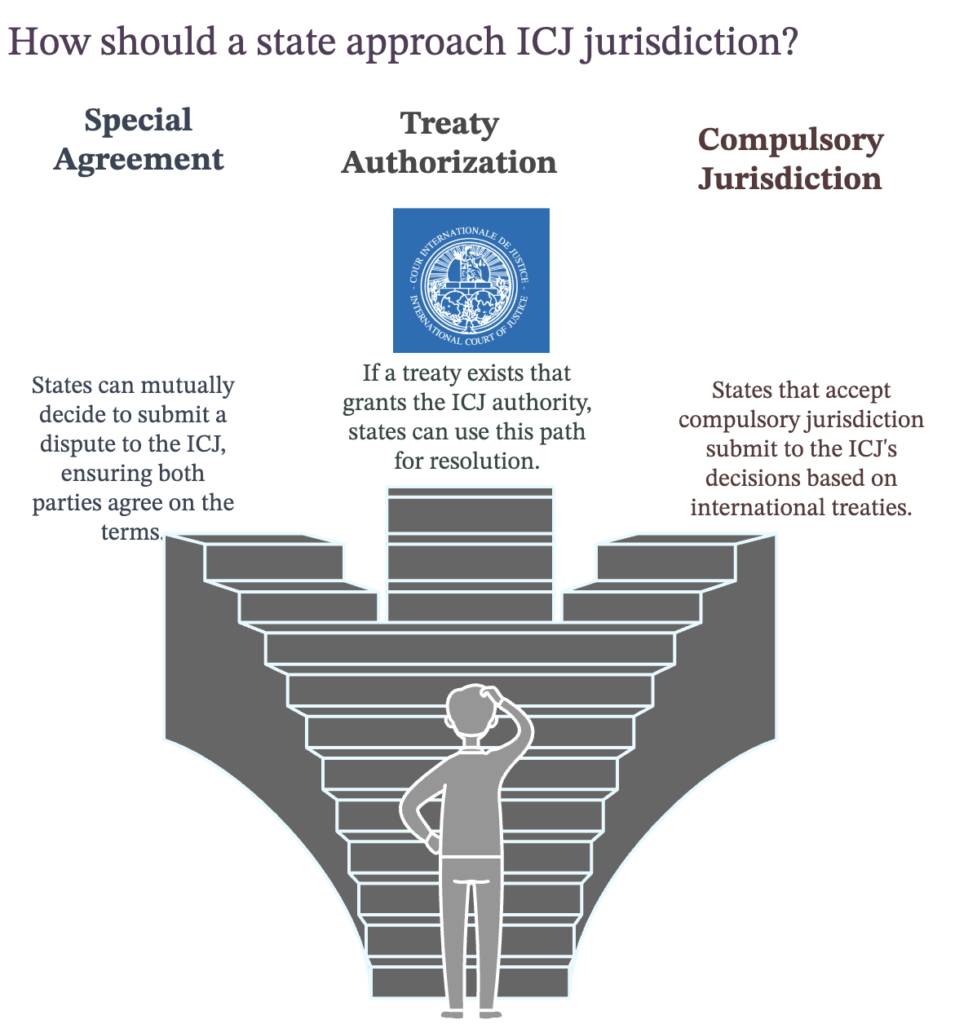
Limitations on the functioning of ICJ
- The ICJ can only hear cases between states. It cannot initiate cases on its own (no suo motu jurisdiction) and requires the consent of all involved parties.
- The ICJ does not have the jurisdiction to try individuals accused of war crimes or crimes against humanity.
- This responsibility lies with specialist international tribunals, such as the International Tribunal for the Law of the Sea (ITLOS).
- International Criminal Court (ICC) which is an intergovernmental body (not a UN body ) established by the Rome Statute in 1998 and headquartered in The Hague deals with crime-related cases.
- If two countries have a treaty that specifies disputes that should not be resolved by the ICJ, the Court cannot hear those cases.
- For example, the Kashmir dispute is governed by the Shimla Agreement between India and Pakistan, which excludes the ICJ from resolving such disputes.
- The ICJ lacks the authority to enforce its judgment. Its decisions are binding but the the Court lacks the authority to obligate states to comply with its judgments.
_______________________________________________________________________________

